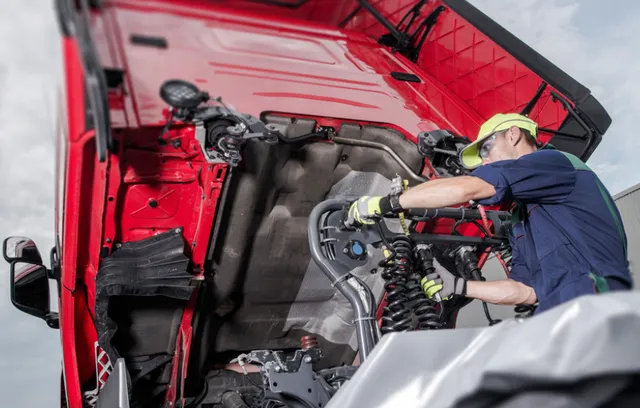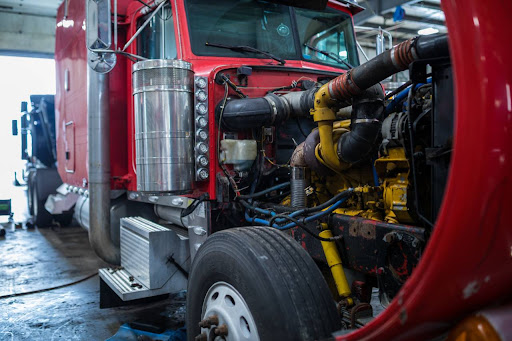The complexity of vehicles today has increased significantly, and their parts and components are constantly evolving. As a result, fleet maintenance personnel must continuously dedicate their time, effort, and resources to learn how to identify and resolve issues with vehicles. This is crucial to ensure that the vehicles remain operational, functional, and capable of traveling on the roads.
Fleet trucks are a critical component of many businesses’ operations. They transport goods and materials, maintain supply chains, and provide essential services. However, like any vehicle, fleet trucks require regular maintenance and repairs to continue operating safely and efficiently.
This article will explore the importance of electrical system maintenance and repair for fleet trucks.
What is a Starter Motor?
The starter motor, an electric motor, “cranks” or spins the engine over to start it. It comprises the starter solenoid connected to the motor and a strong DC (Direct Current) electric motor. The starter motor is often bolted to the engine or gearbox of cars. The car’s main 12-volt battery powers the starter motor. To turn over the engine, the starter motor requires very high electric current, which means the battery has to have sufficient power. If the battery is discharged, the lights in a car might work, but it won’t have enough power (current) to turn over the starter motor.
How to Test Starter Motor.
- When you turn the ignition key to ON position, the engine computer (PCM) checks if the ignition key security code matches (immobilizer). If yes, the engine is allowed to start.
- When you turn the key to the START position or press the START button, the engine computer (PCM) checks if the transmission is in Park or Neutral, if the brake pedal (Automatic) or clutch pedal (Manual) is depressed, and if the steering lock is unlocked (in some cars).
- If all checks pass, the engine computer activates the starter relay.
- The starter relay closes the starter control circuit and activates the starter solenoid.
- The starter solenoid closes the high-current circuit and sends power to the starter motor.
- At the same time, the starter solenoid throws the starter gear forward to mesh it with the engine flexplate gear (or flywheel gear in a manual transmission). The flexplate (flywheel) is attached to the engine crankshaft.
- The starter motor turns over the engine crankshaft fast enough to allow the engine to start. In cars with a push-button start, the system disengages the starter motor as soon as the engine starts running.
What is the Major Difference Between a Contactor and a Motor Starter?
One of the most popular and commonly used components in the world of power distribution is contactors. An electrically controlled switch is known as a contactor. Switch that can handle more than 15 amps. It is a unique kind of relay. It is employed by people to switch an electrical power circuit. This circuit’s power level is significantly lower.
Direct connection to high-current load devices is how the conductor is intended to be used. Numerous equipment, including electric motors, lighting, heaters, capacitor banks, thermal evaporators, etc., are controlled by contactors.
But on the other hand, A starter is a specific type of electrical machine or motor. It regulates how electrical power is applied to machinery. A starter starts motors, as the name suggests. However, it also accelerates, reverses, stops, and protects motors. To start an internal combustion engine running on its power, this gadget is used to rotate or crank it. However, in the case of very big engines, a starter itself may be another internal combustion engine.
An internal combustion engine is a feedback system that starts the subsequent cycle with the inertia from each cycle. In a four-stroke engine, the starter powers the first two strokes rather than the engine itself.
How Important is it to Check the Electrical Systems of a Fleet Truck?
The electrical system of a fleet truck is a vital component that requires regular maintenance and prompt repairs to ensure reliable and safe operation. Taking the time and effort to maintain the electrical mechanic system can provide significant benefits to fleet truck owners and operators, including increased reliability, improved safety, and cost savings over the vehicle’s lifetime.
The Importance of Electrical System Maintenance & Repair
The electrical system of a fleet truck is responsible for a wide range of functions, including starting the engine, powering the lights, providing power to the vehicle’s accessories, and managing its computer systems. As such, any problems with the electrical system can significantly impact the truck’s performance and overall reliability.
Regular truck electrical maintenance of the electrical system can help prevent problems before they arise. This can include checking and replacing the battery, testing the alternator and starter motor, inspecting the wiring and fuses, and ensuring all electrical connections are secure. These tasks can help identify potential issues before they become more severe and lead to costly repairs or downtime.
In addition to regular maintenance, repairs to the electrical system should be carried out promptly when issues arise. Common electrical problems in fleet trucks include starter motor, alternator, battery, and wiring issues. These issues can cause the truck to fail to start, lose power or performance, or even pose a safety hazard if left unaddressed.
Effective repairs to the electrical system require the right tools, expertise, and parts. A skilled technician with experience in working on fleet trucks can diagnose and repair electrical problems quickly and effectively, ensuring the truck is back on the road and operating safely as soon as possible.
Benefits of Electrical System Maintenance & Repair
Effective electrical system maintenance and repair can provide a range of benefits for fleet truck owners and operators. These include:
- Improved Performance: A well-maintained electrical system can help ensure the truck operates at peak performance, providing reliable power and efficiency.
- Increased Reliability: Regular maintenance and prompt repairs can help prevent breakdowns and downtime, ensuring the truck electrical repair when needed.
- Enhanced Safety: Faulty electrical systems can pose a safety hazard to drivers and other road users. Regular maintenance and repairs can help prevent accidents caused by electrical failures.
- Cost Savings: Preventative maintenance and prompt repairs can help avoid costly breakdowns and repairs, reducing the total cost of ownership of the truck over its lifetime.
Tips for Electrical System Maintenance & Repair
To ensure the optimal performance and safety of a fleet truck’s electrical system, it’s essential to prioritize regular maintenance and repairs. Here are some additional tips to help keep your fleet trucks in top condition:
- Conduct regular inspections: Regular inspections of the electrical system can help identify potential problems before they lead to breakdowns or safety hazards. Inspect the battery, alternator, starter motor, wiring, and fuses regularly to ensure they function correctly.
- Check battery connections: Loose or corroded battery connections can cause electrical problems and prevent the truck from starting. Check the battery connections regularly and tighten or clean them as needed.
- Replace the battery as needed: A weak or dead battery can cause starting problems and impact the performance of other electrical components. Replace the battery if it’s over three years old or showing signs of wear, such as slow cranking or dim lights.
- Test the alternator and starter motor: These components are essential to the operation of the electrical system. Have them tested regularly to ensure they function correctly and replace them as needed.
- Use high-quality parts: Using high-qua1lity parts, such as batteries, alternators, and starters, can help ensure the reliability and longevity of the electrical system.
Choose Best Truck Repair Shop For Your Truck Today!

Final Words!
The electrical system is a vital component of any fleet truck, and regular maintenance and repairs are essential to ensure it operates safely and reliably. Effective electrical system maintenance and repair can help improve performance, increase reliability, enhance safety, and provide cost savings for fleet truck owners and operators.
By working with skilled technicians and prioritizing regular maintenance, fleet truck owners can ensure their vehicles operate at peak performance and continue to provide value to their business.

